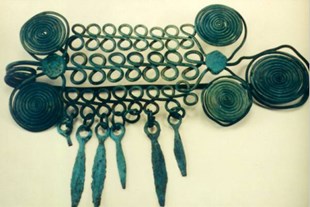Other exhibitions and events in the museum
No data.

| Phone | 385 1 4873 000; 385 1 4873 101 |
| Fax | 385 1 4873 102 |
| Website |
| Monday | |
| Tuesday | 10:00 - 17:00 |
| Wednesday | 10:00 - 17:00 |
| Thursday | 10:00 - 20:00 |
| Friday | 10:00 - 17:00 |
| Saturday | 10:00 - 13:00 |
| Sunday | 10:00 - 13:00 |
| Adults | 20.00 HRK |
| Children | 10.00 HRK |
| Students | 10.00 HRK |
| Pensioners | 10.00 HRK |
| Families | 30.00 HRK |
Permanent exhibition of the Prehistoric collection of the AMZ illustrates the development of material and spiritual culture on the territory of continental Croatia during 2,5 million years, from Paleolithic (Early Stone Age), Neolithic (Late Stone Age), Eneolithic (Copper Age), various phases of the Bronze Age, to Early and Late Iron Age. With its c. 78000 objects the collection is among the largest and most complete of its kind in Croatia and this part of Europe.
The new exhibition - designed by the architect Mario Beusan - was conceptually prepared by the curators of the Prehistoric department, who chose a chronological sequence, with certain individual thematic sections separated out in places where necessary and possible to execute.
The current exhibition utilizes display cases designed in the 1970s by the celebrated Croatian architect Stjepan Planić, thoroughly repaired and partially redesigned. The designer added several new display cases in order to articulate the space and evaluate more appropriately the exhibits.
As opposed to numerous previous exhibitions (the last realized in 1974), the new exhibition emphasizes didactic segment, previously largely ignored: besides the partial reconstruction of a Neolithic house, the same reasoning lead to the addition of appropriate drawings and photographs, as well as virtual pictorial compositions, which should ease the contemplation of the usage of certain objects and the comprehensive view on the life in prehistoric periods. C. 2000 objects are accompanied by appropriate legends and labels, numerous maps - especially the map of prehistoric sites in continental Croatia, structured according to the above mentioned periods.
A board-glass wall with a chronological map depicting characteristic monuments compared to contemporaneous monuments from abroad is of special interest.
No data.